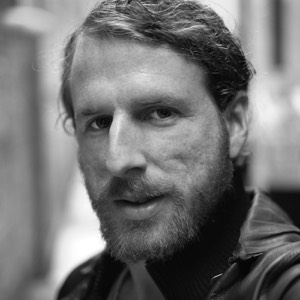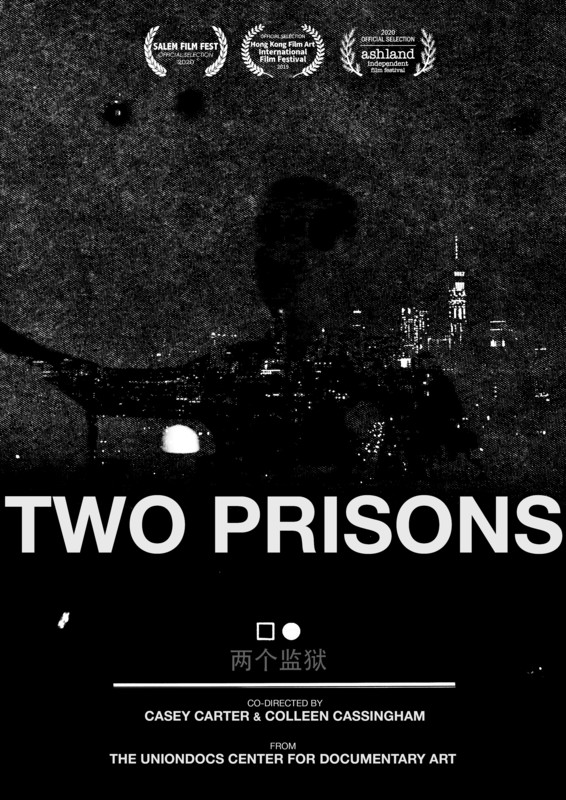Two Prisons
“A provoking document of the Chinese police to detain a human rights blogger, isolating him into deep psychological sadness and fear.” – F3 Film Magazine
Two Prisons USA Documentary Film Website
A young Chinese dissident navigates memories of persecution and paranoia at the hands of Beijing’s political police, while he awaits the result of his application for asylum in New York City.
A young Chinese dissident navigates memories of persecution and paranoia at the hands of Beijing’s political police, while he awaits the result of his application for asylum in New York City.
DIRECTOR PROFILE


Casey Carter, Colleen Cassingham
Director Bios :
CASEY CARTER (Co-director/DP/Editor) is a New York based filmmaker, photographer, and designer. He was a 2017-2018 UnionDocs Collaborative Fellow. His photographs have been published and exhibited in the U.S., Ecuador, and China. He works for Artist and Architect Maya Lin, as the project coordinator for the What Is Missing? Foundation - a global memorial to the ongoing sixth mass extinction. He holds a B.S. in Physics and B.S. in Photography from Middle Tennessee State University and Master of Architecture from the University of Michigan.
COLLEEN CASSINGHAM (Co-director) is a Brooklyn-based documentary filmmaker. Her debut short, FROM DAMASCUS TO CHICAGO, was broadcast on POV in 2017 and was an Editor’s Pick at The Atlantic. She was a 2017-2018 UnionDocs Collaborative Studio fellow and is currently producing a feature documentary called TO USE A MOUNTAIN, supported by Sundance Institute. Colleen is also the Production Manager at Multitude Films, where her credits as Associate Producer include ALWAYS IN SEASON, which won the Special Jury Prize for Moral Urgency at the 2019 Sundance Film Festival, THE FEELING OF BEING WATCHED (Tribeca 2018), and LOVE THE SINNER (Tribeca 2017). Colleen graduated from Northwestern University with a major in Middle East and North African studies and is proficient in Arabic.
Directors Statement : Last summer, 30 years after the brutal crackdown on the 1989 student democracy movement in Tiananmen Square, massive protests swept Hong Kong - the largest the island had ever seen. They have not subsided. This ongoing unrest reflects Hong Kongers’ fear and anger over encroaching authoritarian influence from mainland China. These sorts of demonstrations are impossible in Beijing, where Wang Zhonxia, our film’s protagonist grew up. Since 1989, fear manifests there in silence, and any act of protest is punished, suppressed, and erased. For Wang Zhongxia, designing and printing a few t-shirts set off a decade of persecution.
Two Prisons proceeds in parallel with the pages of Wang Zhongxia’s application for political asylum in the United States. Boxes are checked, evidence assembled, identifiers scribbled in. A narrative is carefully constructed - a personal history laid bare. The application is itself an act of documentary authorship that dissolves through the film into impressionistic memories, humble recollections, and heartfelt testimony. Shot in the first few months of his new life in exile, the streets of New York City became the stage in the retelling of his life under siege in Beijing. The physical artifacts of New York City - an alley in Flushing Queens, an apartment building on the Upper West Side, a taxi cab and a shoddy hotel - take on dramatic and immersive double lives as placeholders for the iconography of his dystopian saga.
The drama of Wang Zhongxia’s circumstance during this film’s production was more internal than external, awaiting the results of his application for asylum - psychologically held between China’s security apparatus and the deliberations of the US Citizenship and Immigration Services. The film therefore attempts as much to illustrate past events as bear witness to the complex emotional dimensions of reimagining and re-enacting memory in a new physical and psychological moment.
Through a decade of persecution, the relentless and manipulative tactics of Beijing’s political police eroded Zhongxia’s mental stability and sense of agency, but never completely broke him. His radical transparency in the retelling of these events reveal an honest and vulnerable perspective that draws us closer than expected to the reality he experienced, confronting its sadness, anger, excitement, and resilience with unexpected intimacy. Embracing the platform we offered, Zhongxia vividly conveys his experience manifestly in service of those who cannot - friends, colleagues, and kindred spirits who remain censored, imprisoned, or otherwise silenced.
Director Bios :
CASEY CARTER (Co-director/DP/Editor) is a New York based filmmaker, photographer, and designer. He was a 2017-2018 UnionDocs Collaborative Fellow. His photographs have been published and exhibited in the U.S., Ecuador, and China. He works for Artist and Architect Maya Lin, as the project coordinator for the What Is Missing? Foundation - a global memorial to the ongoing sixth mass extinction. He holds a B.S. in Physics and B.S. in Photography from Middle Tennessee State University and Master of Architecture from the University of Michigan.
COLLEEN CASSINGHAM (Co-director) is a Brooklyn-based documentary filmmaker. Her debut short, FROM DAMASCUS TO CHICAGO, was broadcast on POV in 2017 and was an Editor’s Pick at The Atlantic. She was a 2017-2018 UnionDocs Collaborative Studio fellow and is currently producing a feature documentary called TO USE A MOUNTAIN, supported by Sundance Institute. Colleen is also the Production Manager at Multitude Films, where her credits as Associate Producer include ALWAYS IN SEASON, which won the Special Jury Prize for Moral Urgency at the 2019 Sundance Film Festival, THE FEELING OF BEING WATCHED (Tribeca 2018), and LOVE THE SINNER (Tribeca 2017). Colleen graduated from Northwestern University with a major in Middle East and North African studies and is proficient in Arabic.
Directors Statement : Last summer, 30 years after the brutal crackdown on the 1989 student democracy movement in Tiananmen Square, massive protests swept Hong Kong - the largest the island had ever seen. They have not subsided. This ongoing unrest reflects Hong Kongers’ fear and anger over encroaching authoritarian influence from mainland China. These sorts of demonstrations are impossible in Beijing, where Wang Zhonxia, our film’s protagonist grew up. Since 1989, fear manifests there in silence, and any act of protest is punished, suppressed, and erased. For Wang Zhongxia, designing and printing a few t-shirts set off a decade of persecution.
Two Prisons proceeds in parallel with the pages of Wang Zhongxia’s application for political asylum in the United States. Boxes are checked, evidence assembled, identifiers scribbled in. A narrative is carefully constructed - a personal history laid bare. The application is itself an act of documentary authorship that dissolves through the film into impressionistic memories, humble recollections, and heartfelt testimony. Shot in the first few months of his new life in exile, the streets of New York City became the stage in the retelling of his life under siege in Beijing. The physical artifacts of New York City - an alley in Flushing Queens, an apartment building on the Upper West Side, a taxi cab and a shoddy hotel - take on dramatic and immersive double lives as placeholders for the iconography of his dystopian saga.
The drama of Wang Zhongxia’s circumstance during this film’s production was more internal than external, awaiting the results of his application for asylum - psychologically held between China’s security apparatus and the deliberations of the US Citizenship and Immigration Services. The film therefore attempts as much to illustrate past events as bear witness to the complex emotional dimensions of reimagining and re-enacting memory in a new physical and psychological moment.
Through a decade of persecution, the relentless and manipulative tactics of Beijing’s political police eroded Zhongxia’s mental stability and sense of agency, but never completely broke him. His radical transparency in the retelling of these events reveal an honest and vulnerable perspective that draws us closer than expected to the reality he experienced, confronting its sadness, anger, excitement, and resilience with unexpected intimacy. Embracing the platform we offered, Zhongxia vividly conveys his experience manifestly in service of those who cannot - friends, colleagues, and kindred spirits who remain censored, imprisoned, or otherwise silenced.
 SF Shorts
SF Shorts